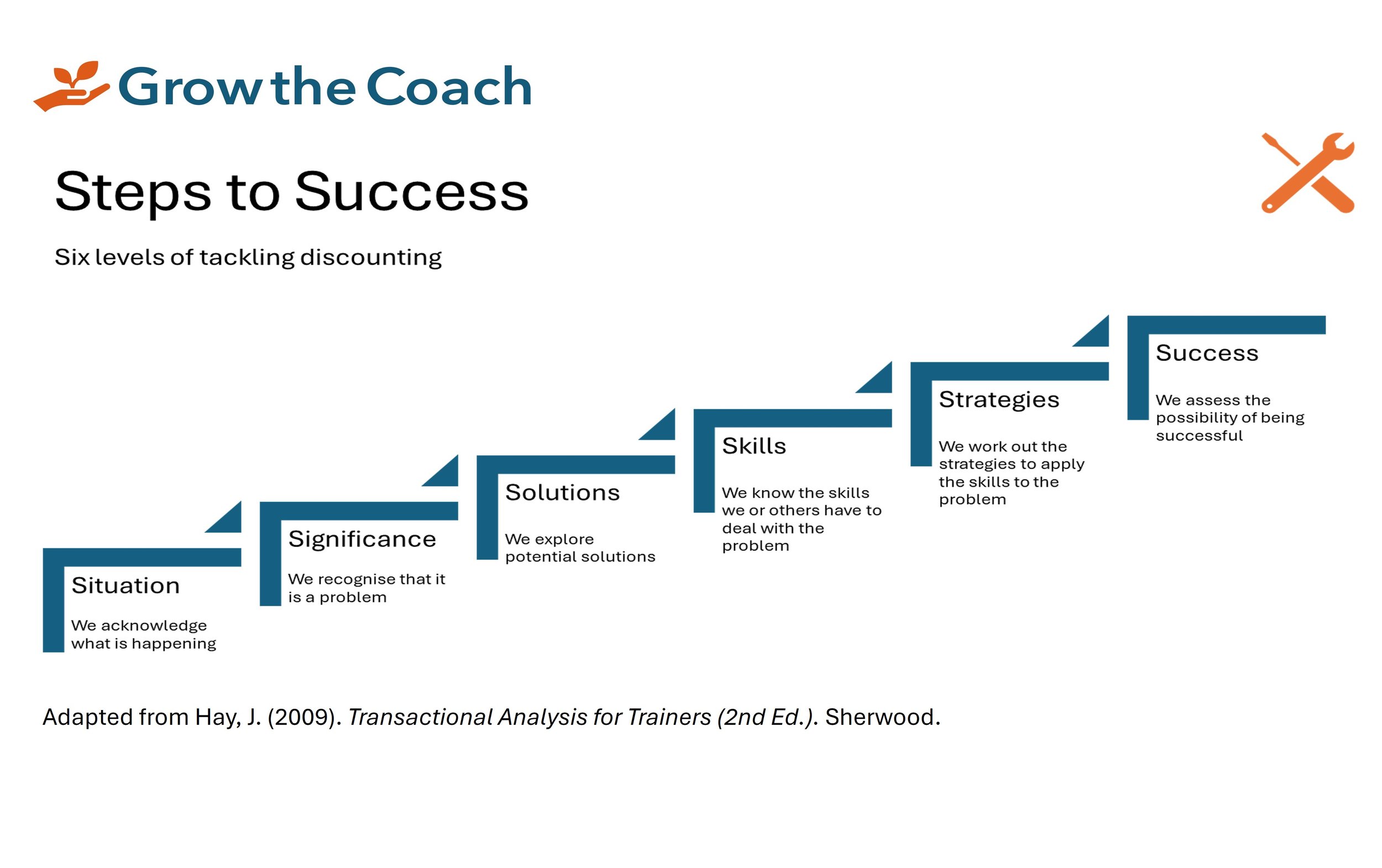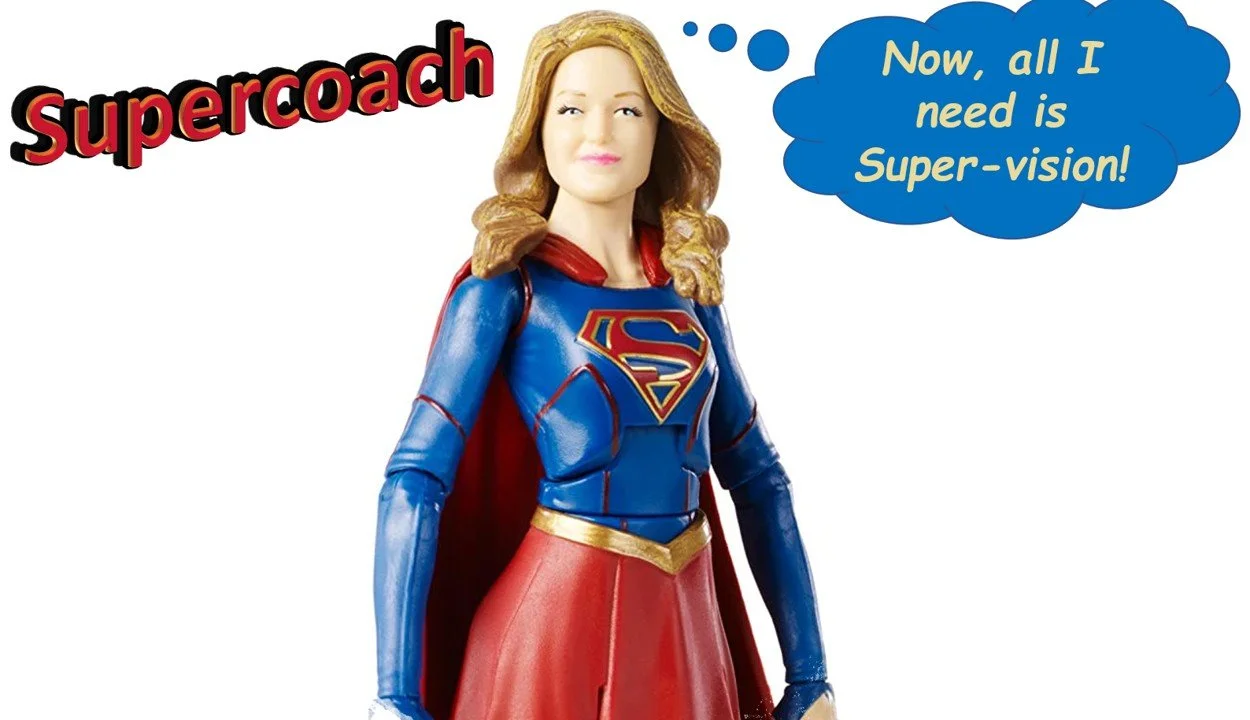
Grow the Coach Newsletter
#165 Introducing CORE: Coaching Observation & Reciprocal Exchange
Athletes know that strengthening their core leads to better balance and stability, more efficient and powerful movement, and reduced risk of injury. Strengthening your coaching core leads to enhanced presence, more effective coaching and reduces your risk of isolation and burnout.
Practising our coaching is the most important way to develop our practical coaching skills. Co-coaching or peer coaching is a great way to experiment with new techniques and learn from others.
CORE is a new, peer-to-peer practice space for coaches who want to deepen their craft through real, relational learning.
#164 Coaching Technique: The Steps to Success
People are really good at keeping themselves stuck by playing the victim. Perhaps they are genuinely unaware of the problem or, if they recognise there is a problem, they engage in what I call BMW (bitching, moaning and whingeing – ie, they blame others for the problem and complain about it, or they either make excuses for why the problem cannot be fixed, or wait and hope that someone else will rescue them.
These are powerless behaviours. People exhibiting these behaviours keep themselves stuck by ignoring aspects of themselves, others or the situation that might help them become unstuck.
The Steps to Success model (Julie Hay, 2009) is a framework from Transactional Analysis that coaches can use with their stuck clients to help them metaphorically step up to adopt some powerful behaviours by addressing what they are discounting.
#163 ‘I know I should have coaching supervision, but setting up my coaching business is getting in the way.’
There is a mismatch between the attitude coaches have toward supervision and their actual engagement with it. In a nutshell, coaches believe they should have supervision, but many find reasons not to.
In this article, I will share the evidence, address some of the challenges that get in the way and make you an offer you can’t refuse!
#162 Seeking new coaches to pilot an approach to running a large supervision group
Group supervision is a powerful form of reflective practice and represents a wonderful opportunity for personal and professional development. It is often undertaken in small, closed groups, and while it is less expensive than 121 supervision, it can still be a substantial outlay for coaches, particularly those who are just starting their coaching career. To date, I have only offered 121 and small group supervision. However, larger groups can be effective and typically cost around 50% of closed group supervision, making them an ideal way to get started with coaching supervision.
#161 Immediate opportunities to join a supervision group
Is 2026 the year to engage in supervision? I have two immediate opportunities to join a supervision group…
#160 Understanding Coaching Supervision
New to coaching?
Just qualified and launching your practice?
Starting out can feel overwhelming, but you don’t have to do it alone. Supervision offers a safe, reflective space to build confidence, explore your identity and grow into the coach you aspire to be.
Join me for a free coaching supervision webinar designed especially for coaches in training and those at the start of their journey.
#159 Thank You for reading my newsletter in 2025
As we reach the close of another year, I want to thank you for being part of Unleash Your Coaching Talents. Your engagement, curiosity and commitment to growth make this community such a joy to nurture.
I wish you a peaceful and restorative festive break, and a happy, prosperous New Year filled with possibility and connection.
#158 Supervision: Crafting Your Coaching Identity One Session at a Time
Starting out as a coach is exciting, yet it can also feel daunting. You’re building your practice, finding your voice, and navigating the challenges of confidentiality, boundaries and ethics. At times, you may wonder: Am I doing this right?
That’s where coaching supervision becomes your greatest ally.
This free webinar is designed especially for coaches in training or those who have just qualified and are launching their practice. It will show you how coaching supervision provides a safe, reflective space to explore dilemmas, strengthen your coaching identity and grow into the practitioner you aspire to be.
#157 The times they are a-changing: what’s your position on the coach's strategy clock?
Coaching often begins as a calling, inspired by service, growth, and human connection. Yet for many, it must also become a sustainable livelihood. Passion alone doesn’t pay the bills, and in today’s crowded marketplace, coaches need to know how to attract clients. Competitive advantage is about choosing a strategy that delivers both impact and income, helping coaches thrive while remaining true to their purpose.
The coach's strategy clock (see picture) is inspired by how businesses think about competitive advantage (see Exploring Corporate Strategy, G. Johnson, K. Scholes & R. Whittington, 2006, Prentice Hall).
In a market with many providers of coaching services, prospective clients choose which offering to accept based on their perception of value-for-money, a combination of price and perceived benefit. The eight numbered zones and the central zone represent possible positions for your coaching strategy.
#156 Coaches: Know Thyself! Ethics, Values and Virtues in Coaching
There is a common understanding among experienced practitioners that professional values are less relevant to practice than the professional bodies might wish. We choose to abide by others' codes when they align with our personal values. However, we are our values, that is, they are an expression of our needs. So, there appears to be a hierarchy, whereby some values are more important than others. Intuitively, this makes sense.
#155 Affordable professional coaching supervision – what are my options?
Whether you earn £8k or £60k per year from coaching, I have an affordable coaching supervision plan for you. Perhaps now is the time to invest in coaching supervision to become a better, safer coach, so your clients receive better, safer coaching.
#154 What is a supervision intervention?
Some people don’t like the word ‘intervention’ because it’s used in therapy, addiction and manoeuvres by the government or the military. However, an intervention is an ‘intentional action taken to change a situation, to improve it or prevent it from getting worse’ (Cambridge Dictionary).
#153 The Princess Practitioner and the Pea
I’m coming to a milestone in a huge project that has kept me absorbed for most of the year. I’m writing a book. It’s a book that sets out the NEEDS framework (a framework that helps coaching supervisors intentionally choose their interventions to meet their supervisees’ needs) that emerged over several years of research into coaching supervision. I have enlisted 17 coaching supervisors to write case studies that help bring the framework to life. It has been a mammoth task thus far in writing half the book and editing the contributions that make up the other half. I’m at the point where the manuscript is nearing readiness for submission to the publisher. Woohoo!
#152 Supervision: seeing through the shame
Let’s name the elephant in the coaching room: supervision sounds like surveillance. Its etymology - ‘super’ (above) + ‘vidēre’ (to see) - evokes control, oversight and judgment. No wonder coaches sometimes shy away. The term conjures memories of being watched, corrected or found wanting. But what if the discomfort isn’t just semantic? What if it’s covering something else?
#151 Why should anyone be coached by you?
In the coaching profession, we often ask clients to reflect on their values, goals and impact. But how often do we turn that lens on ourselves, not just as coaches, but as leaders in relational practice?
Rob Goffee and Gareth Jones (2000) offer a provocative question: Why should anyone be led by you? Their research suggests that followers (or clients, in our case) judge leadership through three lenses: vision, consistency and care. Crucially, these are perceptions, or felt experiences. Clients want to know where you’re taking them, whether you authentically ‘walk your talk’ and if you genuinely care.
#150 Spotting your coaching derailers: A reflective practice
This is the final post about why coaches fail. Being a great coach is about getting the balance just right between not enough and too much, the so-called Goldilocks Effect.
Coaches might underplay or overplay certain behaviours and derail the chances of successfully helping their clients reach their goals. Great coaches manage to strike a balance between these extremes and get it just right.
Today, I’ll offer some reflective questions to help you identify your coaching derailers and how to work on achieving balance in your coaching behaviours.
#149 The coach as instrument: Embodied presence
This is the 11th in a series of 12 posts about why coaches fail. Being a great coach is about getting the balance just right between not enough and too much, the so-called Goldilocks Effect.
Coaches might underplay or overplay certain behaviours and derail the chances of successfully helping their clients reach their goals. Great coaches manage to strike a balance between these extremes and get it just right.
Today, I’ll explore a coach’s use of themselves as an instrument of change, show why embodied presence is so important for effective coaching, and how to get the balance right for yourself.
#148 Goal focus in coaching: awareness and alignment
This is the tenth in a series of 12 posts about why coaches fail. Being a great coach is about getting the balance just right between not enough and too much, the so-called Goldilocks Effect.
Coaches might underplay or overplay certain behaviours and derail the chances of successfully helping their clients reach their goals. Great coaches manage to strike a balance between these extremes and get it just right.
Today, I’ll explore goal focus in coaching, show why goal awareness and alignment is so important for effective coaching, and how to get the balance right for yourself.
#147 Empathy in coaching: the power of a considerate connection
This is the ninth in a series of 12 posts about why coaches fail. Being a great coach is about getting the balance just right between not enough and too much, the so-called Goldilocks Effect.
Coaches might underplay or overplay certain behaviours and derail the chances of successfully helping their clients reach their goals. Great coaches manage to strike a balance between these extremes and get it just right.
Today, I’ll explore the use of empathy in coaching, show why empathising authentically and congruently is so important for effective coaching, and how to get the balance right for yourself.
#146 Imagination in Coaching: Creativity with Purpose
This is the eighth in a series of 12 posts about why coaches fail. Being a great coach is about getting the balance just right between not enough and too much, the so-called Goldilocks Effect.
Coaches might underplay or overplay certain behaviours and derail the chances of successfully helping their clients reach their goals. Great coaches manage to strike a balance between these extremes and get it just right.
Today, I’ll explore the use of imagination in coaching, show why balancing creativity with purpose is so important for effective coaching, and how to cultivate it for yourself.
“I love how you write so succinctly, packing lots in a short piece!”
Sheela - Poole




















